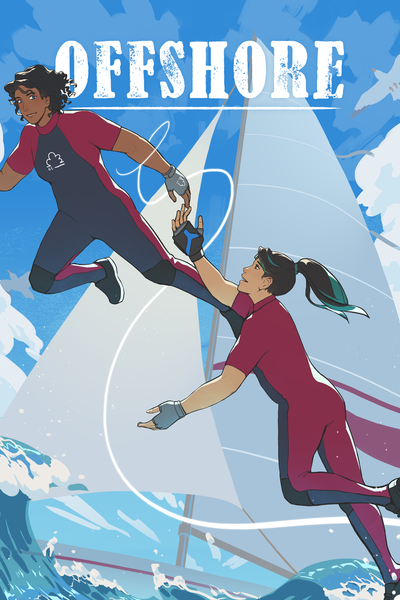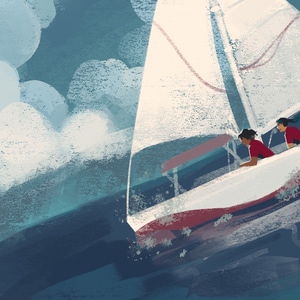The Monday dawn sky was half-cast, thin layers of clouds shrouding vast swathes of the sky. In the sea breeze chill, Jinai and Anqien paced around on the boardwalks in the shelter of the marina offices. Here, half of the facilities were tourist agents and commercial tour boats, and the tang of brine accompanied the endless white noise of waves on piers.
Both sailors wore t-shirts and shorts over their wetsuits, just to be presentable as pedestrians—it wasn’t till they were on the jetties that those came off. They also carried backpacks of supplies—cereal bars, soup in flasks, and a gallon of water between them.
Telaki had long forewarned them that today, they would be thrown back in the deep end with an offshore navigation exercise. Which was reasonable enough: the Niro-Helfi Race wasn’t a short course like the quals had been. It crossed between countries, from one archipelago to another, at one point stretching across ten hours of open sea. Those would be hours where they were utterly out of the sight of land, and then all they had were their instruments, an active line with the team, and their raw intuition for the whims of the sea.
“Get a load of these cruise fares,” Jinai muttered, peering down at a patchwork of ads in the window of a cruise office. “Who pays two hundred shell for this? There isn’t even a stopover!”
Anqien leaned over her right shoulder to inspect the offending poster. “We could make the same trip for free, basically.”
A shout of “my little stars!” echoed from the parking. They abandoned that inane pursuit to find Telaki racing towards them with Meman, Iki and Lujang in tow. Good old Meman, their favourite tugboat pilot of the coast guard, strode up after Telaki with his arms folded, while she waved the two sailors towards him.
“Telaki tells me you’ll sail out to Caiyun and back,” he said as they arrived, moustache bristling.
“Caiyun? That’s news to us,” Anqien said. Iki shrugged.
“That’s the point,” Telaki answered, then turned to Meman. “We’re giving them till, maybe, eight in the evening—” she paused to count on her fingers— “Yeah, thirteen hours. If they aren’t back by then, you’ll go give ‘em a lift. Unless something else comes up, like a storm or something, then you’ll be tugging them back sooner.” She slapped his shoulder. “Nice being paid to stand around, huh?”
“That’s my whole job, isn’t it?” he chuckled. “Caught me at a good time. If these races came a single week later, we’d be right on top of herring season. Then you’d be out of luck with the coast guard.” He turned to the two. “All set?”
They glanced at each other—Jinai looked just about as relaxed as she ever did. Anqien nodded eagerly at Meman.
Telaki was by now leading the entire troupe towards where they had parked the yacht in the marina, eyes peeled for the maroon-painted hull as they strolled up the jetty. A continuous clatter of wheels accompanied them as Lujang lugged her receiver and transmitter trolley along, her sleeve of headsets swinging from the handle. Behind her followed Iki.
They halted in their steps when Telaki called warm-ups, Lujang bringing her entire setup to a stop beside the yacht. During the next lull in their routine, Lujang plucked two headsets out of their sleeves and fitted them over their ears. Pressing her own transmitter to her mouth she said, “Relaying, do you hear me?” The slightly delayed echo in their headsets was louder than her actual voice.
“Loud and clear,” Jinai answered.
“Yes, perfectly clear,” Anqien said.
“Fantastic! Make sure you’re keeping up the back-and-forth, alright?” she said. “Can’t trust the air conditions to stay clean. Never been a problem before, but you never know. If you stop replying, we’re assuming the line’s cut, and we’ll come get you.”
Lujang didn’t normally worry them about issues with the network; it had never gone dead for more than five minutes. But there had been freak storms lately, more than was the norm in spring, and those did a lot more than briefly disturb communications. “What happens if the line dies on the race day?”
“Then you keep going, because we reckon that’s what the other teams will do too. But let’s not worry right now, we get to take our time.”
Once they had passed the safety checks, they unmoored and pushed out onto the waters. The wind rose; the sky swirled. Anqien and Jinai looked over the bay maps for a minute, waxed paper gleaming. Canlan Island ran parallel to the Wulien shore, a large natural barrier sheltering the bay. They were more than halfway to the north end of the island, on the facing shore. Their destination, Caiyun, sat on the west coast of Yenyun Island, about five hours east from here in ideal conditions.
“Current’s moving north through the strait at about three knots,” Iki said in their headsets. “And we have a strong gust of about seven knots coming from northwest. But we’re expecting it to shift to north-northeast by nine o’clock.”
“Hm.” Jinai seemed to ponder the situation. “So we’ll head northeast on a close haul to the tip of Canlan Island, and then tack east.”
“That’s about what I pictured as well,” Anqien answered as they began hoisting the mainsail, wind smoothing and swelling the fabric as it hit the top. “As fun as running downwind would be, I think sailing against the water would defeat the point.”
“If you can round the north end of Canlan Island before the wind turns, that would be perfection,” Telaki replied. “Otherwise you may find yourselves beating your way out.”
Another pause on Jinai’s part; Anqien had a feeling they knew what she was about to suggest. “How about we start dead north, wind on our port side—”
“Then tacked east-northeast once the wind changes?”
She nodded. “Anqien’s got it too. I’d rather we weren’t fighting that northeasterly.”
“Sounds reasonable to me,” Telaki replied. “Always sail towards the mark! I’m expecting you back in ten hours. And we’ll call twelve acceptable.”
“Yeah, yeah,” Jinai smiled. While she rummaged in their bags and pulled out four three-litre flasks, seagulls alighted on their bow in a white flutter, cawing.
Anqien, who had taken their place by the helm, felt their heart lift as they pulled past the last row of boats in the marina, and crossed the line of buoys that marked safe water. Canlan Island rose like a sleeping figure in the distance, blue against the paler blue of the sky. Glancing at the compass, they called, “Port tack!”
Jinai, organising their supplies till now, flew to the mainsheet. “Ready to tack!” she answered. She set the sail into a broad reach, and Anqien laughed, taking the rudder to starboard.
They were underway, coursing out onto the junction of open water where the gyre current from the south met the water rushing out of the bay in a turbulence. The water here was littered with the jagged rocks of sunken roofs, in what was known as the Sunken City, once known in antiquity as Gumeiyen. At their pace, it was not hard steering amongst them. They pressed forth on the power of the northwesterly wind, until the waters began to turn.
As the turbulence gave way to a steady northward stream—discernible by how the water changed colour, from pale and foamy to a steady darkness like strong wine—Anqien called a starboard tack, and on their countdown, they turned towards the wind, reeling the sail in close without so much as a moment’s delay. They pulled into a straight north course, joining the current of the grand strait with Anqien holding the helm steady against the wind’s bias. The chopping of waves was joined by the whistle and cry of seagulls.
“Whoa, that was flawless,” Anqien said. “Good work, team.”
“I know!” Jinai answered, grinning like she had found a diamond. “Finally, a team that just works. Wild, huh.”
“Mostly because of you,” Anqien said, half thinking.
Glancing up, she trimmed the sail to match the wind, and the vessel picked up its pace. “Hah, if teams worked because of me,” she replied, “then the whole fiasco with Oojima wouldn’t have happened.”
“He was bit of a dickhead.”
“That’s my point. You’re the best teammate I’ve ever had, that’s why we’ve been at it for three years. I’m honestly sad we won’t be racing together again after this.”
Anqien wasn’t sure which part of it to respond to—the sorrow of remembering this was the tail end of their career together? Or the more present flush of joy from the compliment? “Just doing my best for the coolest teammate in the world,” they replied.
“Your best is amazing, dear.”
“Hey, enough sappiness, you two,” Telaki cut in through the receivers. “You’re meant to be running this like a proper race leg.”
“Not even a minute of chitchat, huh?” Jinai answered, while Anqien took the moment to steady their breathing and refocus their thoughts.
A glance at the dashboard showed they were facing four degrees from north, travelling at eight knots and rising. The seagulls had long fluttered away, so it was just them, racing northward into the grey-tempered blue.
The wind began to shift when they had made it all but two kilometres to the tip of Canlan Island. It did not shift to a northeasterly immediately, first rotating so it came straight down from the north. When that header hit, they tacked as they had planned, and were carried swiftly towards the white cliffs at the tapering point of the island.
The timing was serendipitous: the wind came to rest pointing northeast right as they pulled northward past the island, following the steep arc of the shore. “And we’re on the open sea,” Jinai announced.
“Masterfully done!” came Telaki’s voice as they made a last tack into their eastward charge. The two sailors grinned, leaning towards each other—Anqien down from the helm and Jinai stretching up from the mainsheet—to bump fists.
Now the far side of Canlan Island revealed itself: miles of cliffs that gazed over churning waters, their grooves and terraces heavy with nesting gulls. Some hundred yards out from the shores, a row of four sea stacks—massive granite columns as tall as the cliffs—formed what one could imagine to be the colonnade of a giant’s hallway. Ahead, the horizon was crisp and uninterrupted, as if drawn with a stencil. Above, the clouds migrated southward, layers condensing and thinning at the whim of the wind.
Out here in the sea, the conditions changed: fewer clear geographic signposts indicated how currents might flow, nothing like the strait which formed a bottleneck. If there were such channels, they were far less apparent from the surface.
But the greatest challenge was always knowing where they were. As advanced and precise as their speedometers and compasses were, some part of the calculation of motion and direction—due to the drift of the currents and the minuscule wobble of their bearing—was always left to chance.
Leaving the sails for several precious second, Jinai unfolded their map and pored over the markings they had at their disposal, glancing now and then at the passing island cliffs and stone stacks as reference points.
“We’ll want to head five degrees south of dead east,” she called out.
Anqien nodded, taking the helm a touch to starboard. “And closer to beam now?”
“Just about to get that.” Jinai stowed the map and sprung to the mainsheet, where she set the sail into a beam reach.
“You making a beeline for Caiyun?” asked Iki through the relay.
“Unless the wind changes, yes,” she replied. “Speaking of which, what’s the wind looking like?”
“It’s set to oscillate between a northwesterly and a northerly, but that shouldn’t change your trajectory, beyond microadjustments.” He clicked his tongue. “Easy day for a trial run, huh?”
“Hey! I can’t tell the future,” Telaki muttered.
“Suits me,” Anqien said. “We’ll just hope for good wind on the race day itself.”











Comments (0)
See all